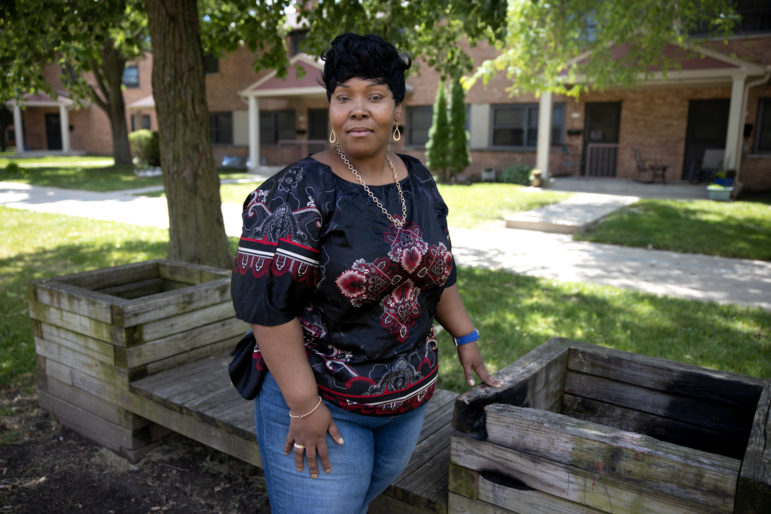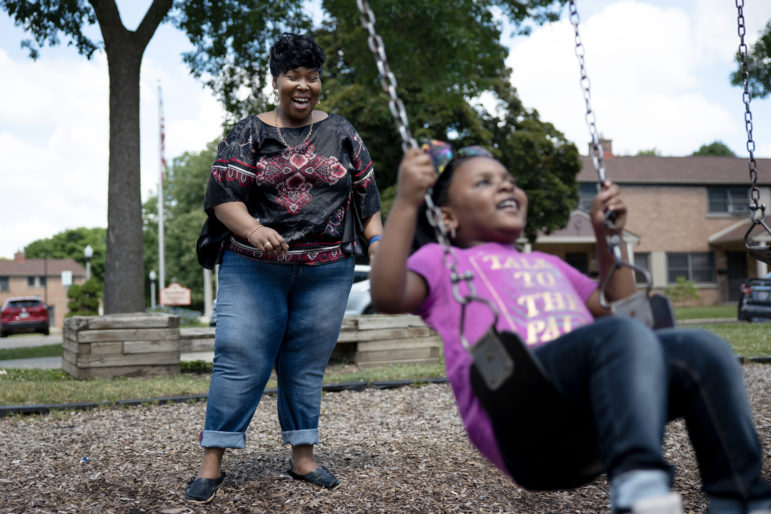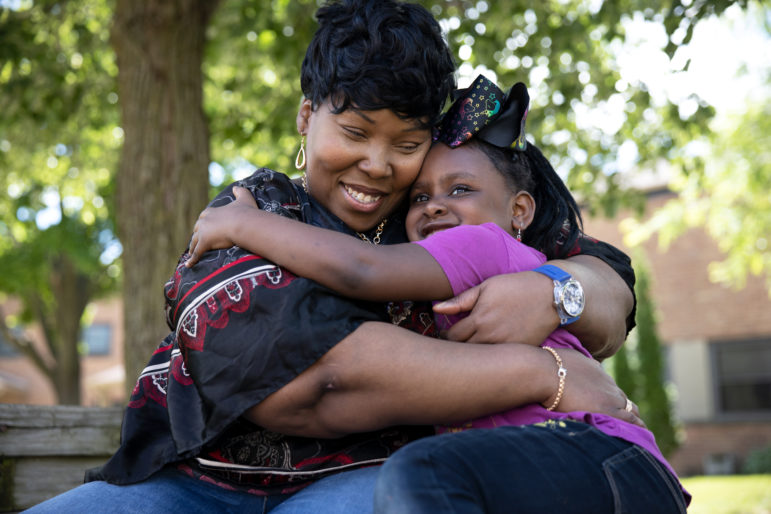Minority Workers Get Less Unemployment Aid?
National studies shows Black, Latino workers typically get less aid. Wisconsin has no data by race.

Alfreida Casterlow lost her job in April with Northwestern Mutual, which she held through the staffing agency Kforce. She immediately applied for unemployment, but has been waiting since April 24 for an adjudicator with the state Department of Workforce Development to resolve her claim. She currently owes more than $2,000 in back rent and late fees. She has no guarantee her unemployment claim will be approved, though a recent call gave her hope. She is seen near her home in Milwaukee on June 23, 2020. Photo by Coburn Dukehart/Wisconsin Watch.
Alfreida Casterlow could hardly bear her first weeks working from home during the coronavirus pandemic. Disrupted routines upset her 20-year-old autistic daughter. Casterlow, 43, would try to keep her daughter engaged. She would lie alongside her, rubbing her forehead to soothe her — all while continuing to operate switchboards for Northwestern Mutual in Milwaukee.
Then she lost her job.
“They let me go at 6 p.m. By 6:05 p.m. I had applied for unemployment,” Casterlow said. “I knew — or at least I felt — like, ‘Okay, Wisconsin’s gonna handle this.’
“I didn’t know how many people were waiting.”
Like thousands of other jobless Wisconsinites, Casterlow is trapped in the purgatory of Wisconsin’s backlogged and overloaded unemployment system — with no income or idea of when it might arrive. She has waited since April 24 for a state Department of Workforce Development (DWD) adjudicator to resolve her unemployment claim.
Wisconsin workers who qualify can receive up to $370 per week in unemployment insurance, plus an extra $600 per week in federal pandemic aid through July 31. Unable to grasp that lifeline, Casterlow said she has not had more than $30 in her pocket since she was laid off. She is struggling to support her household, which includes her daughter and granddaughter.
Casterlow is among more than 700,000 people who filed for regular unemployment in Wisconsin since the pandemic began wreaking economic havoc in March. DWD is closely tracking that and other data points, including unemployment claims by county. The agency is also analyzing data to understand the toll of the pandemic on various industries. But “we do not have race, gender, age, or income reports available,” said agency spokesman Ben Jedd.
DWD Secretary Caleb Frostman acknowledged in an interview that he lacks a “statistical view” of how his agency’s rules and practices might favor some people over others, such as producing different outcomes along racial lines, but “it’s definitely worth having further discussions.”
During a national reckoning about the role of racism in shaping American institutions, some experts say Wisconsin — home to some of the country’s most severe racial disparities in education, public health, housing and criminal justice — should track whether its workforce agency equitably distributes unemployment aid across racial categories.
“You manage what you measure,” said Rebecca Dixon, executive director of the National Employment Law Project, a nonprofit that supports protections for low-wage workers and the unemployed. “And if you’re not even measuring it … it makes it hard to really be able to paint the picture of what’s actually going on.”
The national unemployment rates for Black (16.8%) and Hispanic or Latino (17.6%) workers remain significantly higher than those of white people (12.4%), according to an analysis of May data from the U.S. Bureau of Labor Statistics.
Not everyone who loses a job gets unemployment benefits. In fact, most didn’t before the pandemic. And laid off Black and Latino Americans have historically proved less likely to receive compensation.
A 2012 Urban Institute analysis of national claims from 2010 — during the Great Recession — found that 24% of laid-off Black workers who applied received benefits, compared to 33% of white workers and 29% of workers classified as Hispanic. That was likely due to a mix of socioeconomic disparities and eligibility rules around benefits, the study said.
People of color during the Great Recession were more likely to suffer long-term unemployment, increasing their risk of exhausting benefits, according to the Urban Institute. Like most states, Wisconsin limits unemployment compensation to 26 weeks, although federal CARES Act funds allow states to add up to 13 additional weeks during the pandemic.
Casterlow, who is African American, has yet to resolve her jobless claim as she struggles to keep her family housed and fed during the worst financial crisis since the Great Depression. Wisconsinites of all races sit in similar limbo. But systemic factors in state unemployment insurance systems tend to disadvantage Black workers and other people of color, Dixon said. And the state cannot understand the scope of that problem unless someone looks.
Casterlow said Wisconsin’s unemployment insurance system seems unfriendly to poor people in general.
“A white female can be in the same situation I am in right now — and we are both not getting paid,” Casterlow said. “So I’m not saying it’s not racism, but classism is just as prevalent.”
Steady work hard to come by
Casterlow moved from Detroit to Milwaukee in 2016 — looking for opportunity after struggling for years to find steady work despite having an associate degree in communications. She often pieced together part-time jobs.
Casterlow initially slept on her cousin’s floor while working as a forklift driver at a Chrysler parts distributor, she said. Her granddaughter and daughter, who stayed with her sister in Detroit while Casterlow visited every other weekend, joined her once she set up her life in Milwaukee in late 2017. Casterlow soon left the auto parts gig for a 30-month contract position as a receptionist at Mercer, a consulting firm. She also dispatched taxis part-time for Yellow Cab — helping her pay for an apartment security deposit.

Alfreida Casterlow plays with her granddaughter A’marii Brilliance Felder, 4, at the Berryland Playground near their home in Milwaukee on June 23, 2020. Casterlow, who lives with A’marii and her 20-year-old daughter who has autism, lost her job in April, filed for unemployment assistance the same day, and is still waiting for an adjudicator with the state to resolve her claim. She currently owes more than $2,000 in back rent and late fees and has no guarantee her unemployment claim will be approved. “I’ve smiled through adversity my whole life,” said Casterlow, while acknowledging that she’s going through a very difficult time. Photo by Coburn Dukehart/Wisconsin Watch.
A heart attack sidelined her in March 2019. She paused work at Mercer, she said, and followed her doctor’s advice in quitting at Yellow Cab. What she didn’t realize: Having a “quit” in her work history temporarily would disqualify her from collecting unemployment insurance when her Mercer contract expired that August.
Wisconsin requires unemployment insurance applicants to have worked within the past 18 months and earned a minimum amount of wages. Quitting or being terminated for cause can disqualify a Wisconsin applicant from receiving aid.
Northwestern Mutual referred questions about Casterlow’s employment to Kforce, the staffing agency. Multiple calls to Kforce were routed to a mailbox for the marketing department. A message was not returned.
Casterlow said Kforce advised her to apply for unemployment insurance as someone whose job had been terminated. That kicked her application into a pile of claims needing adjudication. She has since waited two months for a DWD adjudicator to examine whether she qualifies for help.
Structural disparities for Black workers
Many factors could explain why Black workers are less likely than others to receive unemployment aid, according to the 2012 Urban Institute report.
“African Americans are more likely than non-Hispanic whites to have characteristics linked to low (unemployment insurance) recipiency, including low levels of education, concentration in occupations or industries where workers are less likely to be covered, and short tenure on jobs,” the report said.

Alfreida Casterlow is seen with her granddaughter A’marii Brilliance Felder, 4, at the Berryland Playground near their home in Milwaukee on June 23, 2020. Like thousands of other jobless Wisconsinites, Casterlow is trapped in the purgatory of Wisconsin’s backlogged and overloaded unemployment system. She believes she is owed around $8,000 in unemployment assistance, and said she hasn’t had more than $30 in her pocket since she was laid off in April. She supports herself, her daughter and her granddaughter. Photo by Coburn Dukehart/Wisconsin Watch.
Casterlow, with her associate degree, does not check all of those boxes. But her frequent moves between jobs — and complicated circumstances surrounding her exits — have muddled her quest for help.
Other labor market dynamics also may disproportionately prevent Black residents from receiving assistance, experts say.
Black workers typically face nearly double the rate of unemployment compared to white workers, said Valerie Wilson, director of the Program on Race, Ethnicity and the Economy at the Economic Policy Institute, a Washington D.C.-based think tank that aims “to include the needs of low- and middle-income workers in economic policy discussions.” That pattern is “incredibly persistent” in good and bad economic conditions — and across gender, education and geography, Wilson said.
“I find it difficult to attribute something that consistent to anything other than racial discrimination in the labor market.”
The gap has temporarily narrowed during the pandemic, partly because Black workers disproportionately perform “essential” frontline work that continued even as states shuttered their economies to slow the spread of COVID-19, Wilson said.
That overrepresentation has a potentially deadly consequence; it bolsters the odds that those workers will contract COVID-19, which disproportionately infects and kills people of color. Additionally, Black and Latino workers have reported retaliation for raising safety concerns at significantly higher rates than white workers during the pandemic, according to a June National Employment Law Project survey.
African American workers are less likely than white workers to receive jobless aid, even when comparing people with similar education levels and other characteristics, the Urban Institute found.
Tough state eligibility rules also may keep Black workers off of aid rolls, said Margaret Simms, a fellow at the Urban Institute who co-authored the report.
Wisconsin is among the nation’s most stingy in unemployment benefits, and state lawmakers spent much of the past decade making it tougher for people to qualify.
Wisconsin ranks 40th among the states and the District of Columbia in the maximum weekly benefits it offers to unemployed workers, and the Republican-led Legislature enacted a series of laws between 2011 and 2018 that: created a one-week waiting period for benefits (now waived during the pandemic), increased work search requirements for applicants, disqualified people on federal disability from accessing benefits and increased criminal penalties for making false statements or misrepresentations on unemployment insurance applications.
Additionally, Republican Gov. Scott Walker signed a lame-duck law just before Democrat Tony Evers succeeded him that restricts the governor’s ability to waive certain requirements for state-federal benefits programs including unemployment insurance.
DWD officials over the past weeks have been unable to confirm whether those changes disproportionately impact Black workers or other people of color. Agency officials say they do collect demographic information from people who file initial applications. WPR and Wisconsin Watch last week requested that data under Wisconsin’s public records law.
Frostman expressed an openness to examining potential disparities in the state’s unemployment system.
“If there are disparate impacts — whether it’s explicit or implicit — we need to correct those things,” he said.
Research surrounding COVID-19 is clear, Frostman added: “Both from a public health and from an economic standpoint, (the pandemic) disproportionately affects communities of color.”
The pandemic, Frostman added, offers a “once-in-a-generation opportunity to redefine the relationship between work and quality of life,” including for communities of color.
Dixon said state agencies should closely watch the trajectory of unemployment among Black residents as the pandemic continues. If it peaks later or grows more persistent — as has happened in past downturns — rates of assistance might plunge, too. Congress could address that problem by extending the July 31 deadline for the program that adds $600 in federal funds to weekly unemployment checks, Dixon added.
Hope follows frustration
DWD has hired hundreds of extra workers to field the avalanche of calls coming from laid off workers seeking help. The agency reported nearly 343,000 calls last week alone, and claimants frequently complain of being unable to get through on the phone lines for months at a time.
Casterlow said she reached a call center staffer a few weeks ago, only to be told there was nothing the woman could do to help. The message Casterlow heard: Just be patient.
She tried calling again at 7:30 a.m. on June 22, joining the queue as number 199. More than four hours later she was behind just nine callers — only to have her call dropped, she said.
“It’s daunting and unbelievable, but I can’t give up, or hope will die,” she said.
Following that defeat, Casterlow described her hardship in an email to Evers’ office, attaching photos of herself and her granddaughter. She was dejected to receive a boilerplate response.
But a call on June 25 offered an infusion of hope. An adjudicator told Casterlow that Evers’ office had instructed him to call — citing Casterlow’s tough circumstances. The adjudicator already knew her case’s details and had identified a major error holding up her claim, she said: Although Northwestern Mutual ended her contract, Kforce, the staffing agency, still employed her. Casterlow’s exit should not be classified as a termination for cause, but rather as Kforce’s inability to find her a new job due to the pandemic, Casterlow said she was told.
Casterlow was informed that the adjudicator sent a letter asking Kforce to clear up the issues holding up her claim, and DWD would grant the claim by default if the company failed to respond within a week.
“This man was so friendly I wanted to hug him,” Casterlow said. “He was like, ‘I’m gonna take care of this for you. You’re fine, I’ll handle it.’ And he made me feel like he was so capable.”
She added: “It’s sad that a lot of people (waiting on unemployment claims) won’t see that.”
This story comes from a partnership of Wisconsin Watch and WPR. Bram Sable-Smith is WPR’s Mike Simonson Memorial Investigative Fellow embedded in the newsroom of Wisconsin Watch (wisconsinwatch.org), which collaborates with WPR, PBS Wisconsin, other news media and the University of Wisconsin-Madison School of Journalism and Mass Communication. Coburn Dukehart, Wisconsin Watch digital and multimedia director, contributed reporting. All works created, published, posted or disseminated by Wisconsin Watch do not necessarily reflect the views or opinions of UW-Madison or any of its affiliates.
-
Wisconsin Lacks Clear System for Tracking Police Caught Lying
 May 9th, 2024 by Jacob Resneck
May 9th, 2024 by Jacob Resneck
-
Voters With Disabilities Demand Electronic Voting Option
 Apr 18th, 2024 by Alexander Shur
Apr 18th, 2024 by Alexander Shur
-
Few SNAP Recipients Reimbursed for Spoiled Food
 Apr 9th, 2024 by Addie Costello
Apr 9th, 2024 by Addie Costello





















